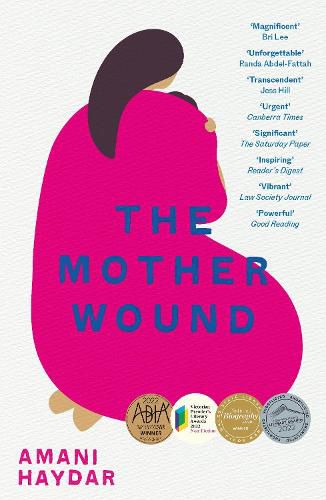Readings Newsletter
Become a Readings Member to make your shopping experience even easier.
Sign in or sign up for free!
You’re not far away from qualifying for FREE standard shipping within Australia
You’ve qualified for FREE standard shipping within Australia
The cart is loading…






Winner of the Prize for Nonfiction at the 2022 Victorian Premier’s Literary Awards
‘I am from a family of strong women.’
Amani Haydar suffered the unimaginable when she lost her mother in a brutal act of domestic violence perpetrated by her father. Five months pregnant at the time, her own perception of how she wanted to mother (and how she had mothered) was shaped by this devastating murder.
After her mother’s death, Amani began reassessing everything she knew of her parents’ relationship. They had been so unhappy for so long - should she have known that it would end like this? A lawyer by profession, she also saw the holes in the justice system for addressing and combating emotional abuse and coercive control.
Amani also had to reckon with the weight of familial and cultural context. Her parents were brought together in an arranged marriage, her mother thirteen years her father’s junior. Her grandmother was brutally killed in the 2006 war in Lebanon, adding complex layers of intergenerational trauma.
Writing with grace and beauty, Amani has drawn from this a story of female resilience and the role of motherhood in the home and in the world. In The Mother Wound, she uses her own strength to help other survivors find their voices.
$9.00 standard shipping within Australia
FREE standard shipping within Australia for orders over $100.00
Express & International shipping calculated at checkout
Winner of the Prize for Nonfiction at the 2022 Victorian Premier’s Literary Awards
‘I am from a family of strong women.’
Amani Haydar suffered the unimaginable when she lost her mother in a brutal act of domestic violence perpetrated by her father. Five months pregnant at the time, her own perception of how she wanted to mother (and how she had mothered) was shaped by this devastating murder.
After her mother’s death, Amani began reassessing everything she knew of her parents’ relationship. They had been so unhappy for so long - should she have known that it would end like this? A lawyer by profession, she also saw the holes in the justice system for addressing and combating emotional abuse and coercive control.
Amani also had to reckon with the weight of familial and cultural context. Her parents were brought together in an arranged marriage, her mother thirteen years her father’s junior. Her grandmother was brutally killed in the 2006 war in Lebanon, adding complex layers of intergenerational trauma.
Writing with grace and beauty, Amani has drawn from this a story of female resilience and the role of motherhood in the home and in the world. In The Mother Wound, she uses her own strength to help other survivors find their voices.
Amani Haydar is a remarkable woman. A lawyer by training, she is also an acclaimed artist who has been a finalist for the Archibald Prize, and with the publication of her memoir, The Mother Wound, she can add ‘accomplished writer’ to her list of talents. Haydar’s superb memoir begins as she becomes a mother. In the joyous moments following the successful delivery of her first child, a well-meaning midwife asks Amani, ‘So, where is your mother’, to which Amani gives a truthful answer: ‘she was murdered in March by my father’. Amani’s mother, Salwa Haydar, was killed by her husband in a frenzied stabbing attack that was witnessed by one of Amani’s sisters, who was also injured when she tried to intervene. This book is a daughter’s tribute to her mother’s life, an acknowledgement of the deep trauma and devastation caused by domestic violence, and an account of grief experienced at its most extreme during pregnancy and early motherhood. It is also a story of a victim’s experience of the courtroom and the act of giving evidence as witness, made even more poignant because of Haydar’s legal background.
While the subject of this memoir is horrifying, reading this exceptional work is a pleasure thanks to Haydar’s beautifully crafted words. Its measured fury is a testament to its writer’s intent to honour the life of her mother through education and action, and I learned so much reading this book. Haydar generously shares stories about Lebanese migrant experience in Western Sydney, the place of remorse in sentencing, Islamic faith and spirituality, the complexities (and sometimes punishments) of familial expectation and obligation, the hard work and incredible personal resolve it takes to recover from trauma, and so much more besides. That her maternal grandmother also died too young, and as a victim of violence during war, speaks to the larger themes that underpin the book: the transference of trauma across generations, particularly as it passes between mothers and daughters – the ‘mother wound’ of the book’s title – and the connections between the violence of the state and violence in the domestic sphere. This is an important and outstanding book, one that deserves a wide readership ready to accept its lessons with the same open-heartedness in which they are offered.